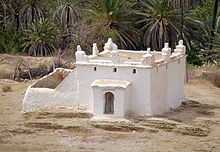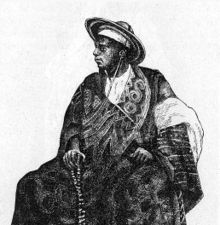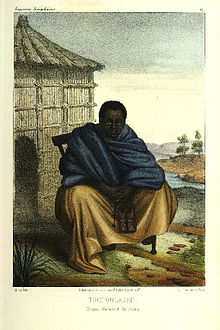- Marabout
-
This article is part of the series: Islam 
 Marabout's tomb, southern Morocco
Marabout's tomb, southern Morocco
 Sénégalese Marabout, (1890)
Sénégalese Marabout, (1890)
A marabout (Arabic: مَربوط [marbūṭ] or Arabic: مُرابِط [murābiṭ], one who is attached/garrisoned) is a Muslim religious leader and teacher [1] in West Africa, and (historically) in the Maghreb. The marabout is often a scholar of the Qur'an, or religious teacher. Others may be wandering holy men who survive on alms, Sufi Murshids ("Guides"), or leaders of religious communities. Still others keep alive syncretic pre-Islamic traditions, making amulets for good luck, presiding at various ceremonies, telling the future, and in some cases actively guiding the lives of followers. The common practice of receiving gifts or money for this service is disapproved of by orthodox Muslims.[1]
Contents
The Maghreb
The term Marabout appears during the Muslim conquest of North Africa. It is derived from the Arabic word "Mourabit" or "mrabet" (one who is garrisoned)[2]: religious students and military volunteers who manned the Ribats at the time of the conquest.[3] Today marabout means "Saint" in the Berber language, and refers to Sufi Muslim teachers who lead lodge or school called a zaouïa, associated with a specific school or tradition, called a Tariqah (طريقه Ṭarīqah: "way", "path").
The pronunciation of that word may vary according the spoken Berber dialect, for example it is pronounced as "Amrabadh" in the Riff dialect. The "marabout" is known as "Sayyed" (سيد) to the Arabic speaking Maghribians. Many cities in Morocco got their names from local "marabouts", and the name of those cities does usually begin with "Sidi" (سيدي) followed with the name of the local "marabout." The standard Arabic for "saint" would be "Waliy" (ولي).
Syncretic holy sites
A marabout may also refer to a tomb (Arabic: قُبّة [qubba]) of a venerated saint, and such places have become holy centers and places of pious reflection.
The roots of this tradition can be traced back to ancient times when the Berbers believed in the polytheistic religions. Herodotus mentioned the tradition too, when he has spoke of the Nasamones bringing animal sacrifices to the tombs of holy men.
Some Zawiyas linked with specific marabouts
Note that these are not places of formal pilgrimage (limited in Islam to religious pilgrimages of the Hadj and Jerusalem), but are rather places of reflection and inspiration for the pious.
- Morocco
- Sidi Ali el Goumi
- Sidi Allal el Behraoui
- Sidi Abdelah ben Hassoun
- Sidi Moulay Idriss
- Sidi fath
- Sidi el Arbi ben sayyeh
- Sidi Ahmed Tijani
- Sidi Moulay Ali sherif
- Sidi Hajj Hamza Qadiri Boutchichi
- Sidi Sheikh Abdul Qadir Jilani
- Sidi Abdel Kader el Alami
- Sidi Moulay Ibrahim
- Sidi Mohammed Ben Aissa
- Sidi Ahmed Ben Idris Al-Fassi (Idrissiya and Sanoussiya)
- Sidi Abu Lhcen Shadili
- Sidi Abdeslam ibn Mchich Alami
- Sidi Muhammad al-Arabi al-Darqawi
- Sidi Muhammad ibn Sulayman al-Jazuli al-Simlali
- Sidi Abu Abdallah Mohammed Amghar
- Sidi Abu Abdallah al-Qaim bi Amrillah
- Sidi Muhammad ben Issa al-Barnusi al-Fasi Zarruq
Or
-
- zawiyas:
- Zaouïa Naciria
- Zaouïa Cherqaouia
- Zaouia Aïssaouia
- Zaouia Tidjaniya
- Zaouia Idrissiya
- Zaouia Sanoussiya
- Zaouia Al Qadiriya
- Zaouia Al Alamiya
- Zaouia Jazouliya semlaliya
- Zaouia Hamdouchia
- zawiyas:
- Algeria
- Sidi Ahmed Tidjani de 'Ainou Mahdi proche de Laguouate fondateur dela Tidjaniya
- Sidi M'hamed Bou Qobrine Founder of the Rahmaniya (Algiers and Bounouh)
- Sidi Abderrahmane Thaalibi Founder of the Thaalibiya (Algiers)
- Sidi M'hend oumalek (Tifrit nait oumalek)
- Sidi Moh'Ali oulhadj (Tifrit n'Aït el Hadj)
- Sidi Harrat Benaissa El Idrissi (Zemmora, Relizane)
- Sidi Abd-Allah ben Mançour
- Sidi Abdelkader djilali (tizi-ouzou)
- Sidi Abid Echerrif (Guentis)
- Sidi Abou AbdAllah Ech Choudi El Halloui
- Sidi A'hmed el Mejdoub
- Sidi Bel Abbes (namesake of Sidi Bel Abbès)
- Sidi Ben-Ali (Aïn el Hout - Tlemcen)
- Sidi Ben-Ali (Nédromah)
- Sidi Ben-Azzouz (Borj Ben Azzouz)
- Sidi Bicinti el basco
- Sidi Bou Adjami
- Sidi Boudarga
- Sidi Boudjemaa
- Sidi Brahim
- Sidi Daoudi
- Sioud anta' El-Eubbad es-Saffi
- Sidi En-Naceur
- Sidi Et Toumi
- Sidi Hamadouche
- Sî ibn 'Alî Sharîf (Akbou)
- Sidi Mohammed Ben Omar El Houari
- Sidi Mohammed bou Semah'a,
- Sidi Moh'amed Ou'l Il'afian.
- Sidi Moulebhar
- Sidi Qadir
- Sidi Bel-Ezrag
- Sidi Serhane
- Sidi ghiles (tipaza)
- Sidi Soumeymane Ben Abdallah
- Zaouia de Sidi Benamar (Fillaoussenne)
- Sidi-Wahhab
- Sidi Yahia el Aidly (Akbou)
- Sidi Yakkout
- Tunisia
- Zaouïa de Sidi Ben Azzouz. Nefta
- Zaouïa de Sidi Bouteffaha. Béja
- Zaouïa de Sidi Salah Zlaoui. Béja
- Zaouïa de Sidi Abdelkader. Béja
- Zaouïa de Sidi Bou Arba. Béja
- Zaouïa de Sidi Taieb. Béja
- Zaouïa de Sidi Baba Ali Smadhi. Béja
- Zaouïa de Sidi Ali El Mekki
- Zaouïa de Sidi El Mazri. Monastir
- Zaouïa de Sidi Bou Jaafar. Sousse
- Zaouïa de Sidi Abdel Hamid. Sousse
West Africa
Muslim religious teachers
Muslim religious brotherhoods (Tariqah in the Sufi tradition) are one of the main organizing forms of West African Islam, and with the spread of Sufi ideas into the area, the marabout's role combined with local practices throughout Senegambia, the Niger river valley, and the Futa Jallon. Here, Sufi believers follow a marabout, elsewhere known as a Murshid ("Guide"). Marabout was also adopted by French colonial officials, and applied to most any imam, Muslim teacher, or secular leader who appealed to Islamic tradition.
Today marabouts can be traveling holy men who survive on alms, religious teachers who take in young talibes at koranic schools, or distinguished religious leaders and scholars, both in and out of the sufi brotherhoods which dominate spiritual life in Senegambia.[4]
In the Muslim brotherhoods of Senegal, marabouts are organized in elaborate hierarchies; the highest marabout of the Mourides, for example, has been elevated to the status of a Caliph or ruler of the faithful (Amir al-Mu'minin). Older, North African based traditions such as the Tijaniyyah and the Qadiriyyah base their structures on respect for teachers and religious leaders who, south of the Sahara, often are called marabouts. Those who devote themselves to prayer or study, either based in communities, religious centers, or wandering in the larger society, are named marabouts. In Senegal and Mali, these Marabouts rely on donations to live. Often there is a traditional bond to support a specific marabout that has accumulated over generations within a family. Marabouts normally dress in traditional West African robes and live a simple, ascetic life.
Child exploitation schemes
Main article: TalibesSome Senegalese marabouts have been accused of exploiting young students, recruiting young boys from all over Senegal and neighboring countries to enroll in their schools. These children are then forced to beg on the streets for money under threat of physical harm, while their teachers take the profits, leaving the children without proper clothing, food or shelter.[5] This exploitation is in stark contrast to the tradition of Marbout-led koranic schools which have operated across West Africa for centuries.
Syncretic spiritualists
The spread in sub-saharan Africa of the marabout's role from the eighth through 13th centuries CE created in some places a mixture of roles with pre-Islamic priests and devines. Thus many fortune tellers and self styled spiritual guides take the name marabout (something rejected by more othodox Muslims and Sufi brotherhoods alike). The recent diaspora of West Africans (to Paris in particular) has brought this tradition to Europe and North America, where some marabouts advertise their services as fortune tellers.[6] [7][8]
See also
References
- ^ a b Roncoli, Keith; Kirshen, Paul; Kirshen, Paul (June 2002). "Reading the Rains: Local Knowledge and Rainfall Forecasting in Burkina Faso". Society and Natural Resources 15 (2): 409–427. doi:10.1080/08941920252866774. "Marabouts are Islamic spiritualists who are also believed to have the capacity to foresee but not control the future. These spiritualists range from conventional Islamic clerics (Limam) who are versed in the Koran and preside over services at local mosques, to local healers and diviners who mix Islam with indigenous beliefs and practices. Some marabouts practices resemble those of getba, with Islamic verses replacing cowries. Most marabouts receive gifts or money for their services, with the most respected and renowned marabouts drawing substantial income from their practice. However, these practices are generally disapproved by Islamic orthodoxy."
- ^ marabout -- Britannica Online Encyclopedia.
- ^ "LE SOUFISME: Problèmes de terminologie : soufi, marabout, fakir et derviche" from www.nuitdorient.com, 3 April 2003.
- ^ Lamin O. Sanneh The Crown and the Turban: Muslims and West African. Westview Press (1997) ISBN 0813330599
- ^ "Islamic Schools Lure African Boys Into Begging", Associated Press, April 20, 2008.
- ^
- Liliane Kuczynski. Les marabouts africains à Paris . CNRS Editions, Paris (2003) ISBN 978-2271060877
- Magopinaciophilie at virtualsined.com. An article discussing Europeans who collect calling card like advertisements by "marabouts".
- L'officiel du Marabout: Parisian advertisement collection.
- [1], Belgian advertisement collection.
- Magopinaciophiles, a collection of French flyers.
- ^ Senegal Ahmadou Bamba, Cheikh Ahmadou Bamba Mbacké (1853-1927) (Aamadu Bàmba Mbàkke in Wolof, Shaykh Aḥmad ibn Muḥammad ibn Ḥabīb Allāh in Arabic, also known as Khadīmu 'l-Rasūl or "The Servant of the messenger" in Arabic, and as Sëriñ Tuubaa or "Cheikh of Tuubaa" in Wolof), was a Muslim Sufi religious leader in Senegal and the founder of the large Mouride Brotherhood (the Muridiyya). See Muslim brotherhoods of Senegal. Cheikh Ahmadou Bamba was a mystic and religious leader who produced a prodigious quantity of poems and tracts on meditation, rituals, work, and Qur'anic study. Politically, Ahmadou Bamba led a pacifist struggle against French colonialism while not waging outright war on the French as several prominent Tijaan marabouts had done.
- ^ Ahmadou Bamba, Cheikh Ahmadou Bamba Mbacké (1853-1927) (Aamadu Bàmba Mbàkke in Wolof, Shaykh Aḥmad ibn Muḥammad ibn Ḥabīb Allāh in Arabic, also known as Khadīmu 'l-Rasūl or "The Servant of the messenger" in Arabic, and as Sëriñ Tuubaa or "Cheikh of Tuubaa" in Wolof), was a Muslim Sufi religious leader in Senegal and the founder of the large Mouride Brotherhood (the Muridiyya). See Muslim brotherhoods of Senegal. Cheikh Ahmadou Bamba was a mystic and religious leader who produced a prodigious quantity of poems and tracts on meditation, rituals, work, and Qur'anic study. Politically, Ahmadou Bamba led a pacifist struggle against French colonialism while not waging outright war on the French as several prominent Tijaan marabouts had done.
- (French) Christian Coulon, Pouvoir maraboutique et pouvoir politique au Sénégal, Paris, Université de Paris, 1976, 2 vol. 594 p. (Thèse d’Etat, remaniée et publiée en 1981 sous le titre Le marabout et le prince. Islam et pouvoir au Sénégal, Paris, Pedone, XII-317 p.)
- (French) Bassirou Diop, Le rôle joué par les marabouts toucouleurs dans l’islamisation du Sénégal, Dakar, Université de Dakar, 1983 (Mémoire de Maîtrise)
- Christopher Harrison. France and Islam in West Africa, 1860-1960 Cambridge University Press (1988) ISBN 0-521-35230-4
- E. Westermarck: Ritual and Belief in Morocco. London 1926.
- Leonardo Alfonso Villalón. Islamic Society and State Power in Senegal: Disciples and Citizens in Fatick Cambridge University Press, (1995) ISBN 0-521-46007-7
External links
- wikimouridia.org ويكي مريدية
- (French) majalis project
- (French) Informations sur le Marabout de Blida éditions Gandini
- (French) Chez les Bni Haoua, travail artistique Laurence Huet et Maïssa Bey autour d'une femme marabout
- (French) Gnawa et Marabout au Maroc Bertrand Hell, Le Tourbillon des génies : au Maroc avec les Gnawa
- (French) Sur un marabout de Ténés en Algérie de Leïla Sebbar
- (French) Zaouïas en Tunisie, présentation de nombreuses zaouïas à travers le pays
- (French) Samy Ghorbal, « Marabouts & zaouïas de Tunisie. Histoire et légendes », Saisons tunisiennes
- (French) Sidi Bouteffaha Béja. Tunisie, photographies de zaouïa en Tunisie
- (French) Sidi Bouteffaha Béja. Tunisie
- (French) Sidi Salah Zlaoui Béja. Tunisie
- (French) Sidi Abdelkader Béja. Tunisie
- (French) Sidi Bou Arba Béja. Tunisie
- (French) Sidi Taieb Béja. Tunisie
- (French) Sidi Baba Ali Smadhi Béja. Tunisie
Categories:- Maghreb
- Islam in Africa
- Religious leadership roles
- History of North Africa
- Islamic mysticism
- Religion in Africa
- French West Africa
- West Africa
- Morocco
Wikimedia Foundation. 2010.


